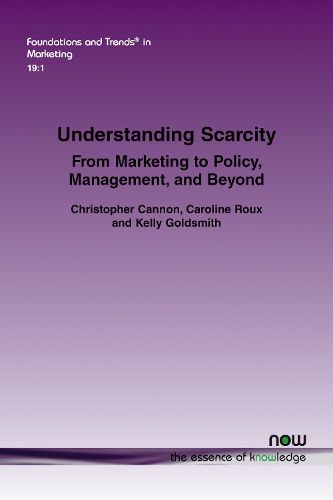Readings Newsletter
Become a Readings Member to make your shopping experience even easier.
Sign in or sign up for free!
You’re not far away from qualifying for FREE standard shipping within Australia
You’ve qualified for FREE standard shipping within Australia
The cart is loading…






This title is printed to order. This book may have been self-published. If so, we cannot guarantee the quality of the content. In the main most books will have gone through the editing process however some may not. We therefore suggest that you be aware of this before ordering this book. If in doubt check either the author or publisher’s details as we are unable to accept any returns unless they are faulty. Please contact us if you have any questions.
Understanding Scarcity: From Marketing to Policy, Management, and Beyond explores the intricate relationship between scarcity and consumer behavior, drawing on decades of research across marketing, economics, and psychology. Marketers have long utilized scarcity tactics such as "limited time" or "limited quantity" promotions to boost demand, rooted in the principle that "scarcity increases value". The 2007-2009 Great Recession ignited a fresh wave of interest in scarcity as more than just a promotional tool-it became a complex psychological state driven by macroeconomic factors, personal experiences, and even subtle environmental cues. This monograph captures that shift, examining scarcity as both a chronic condition and a mindset that influences every stage of consumer decision-making.
This monograph highlights how scarcity can be triggered by anything from financial deprivation to simple social comparisons. The authors illuminate the profound impact of scarcity on consumer motivation, willingness to pay, and effort expended to acquire products. Drawing from a diverse range of findings, this work offers novel implications for public policy, marketing strategies, and management decisions. The authors not only review historical and contemporary research on scarcity but also offer a forward-looking agenda for future studies. Perfect for scholars and practitioners alike, this monograph offers a rich understanding of how scarcity shapes behavior, and how businesses and policymakers can harness power to better serve their audiences.
$9.00 standard shipping within Australia
FREE standard shipping within Australia for orders over $100.00
Express & International shipping calculated at checkout
This title is printed to order. This book may have been self-published. If so, we cannot guarantee the quality of the content. In the main most books will have gone through the editing process however some may not. We therefore suggest that you be aware of this before ordering this book. If in doubt check either the author or publisher’s details as we are unable to accept any returns unless they are faulty. Please contact us if you have any questions.
Understanding Scarcity: From Marketing to Policy, Management, and Beyond explores the intricate relationship between scarcity and consumer behavior, drawing on decades of research across marketing, economics, and psychology. Marketers have long utilized scarcity tactics such as "limited time" or "limited quantity" promotions to boost demand, rooted in the principle that "scarcity increases value". The 2007-2009 Great Recession ignited a fresh wave of interest in scarcity as more than just a promotional tool-it became a complex psychological state driven by macroeconomic factors, personal experiences, and even subtle environmental cues. This monograph captures that shift, examining scarcity as both a chronic condition and a mindset that influences every stage of consumer decision-making.
This monograph highlights how scarcity can be triggered by anything from financial deprivation to simple social comparisons. The authors illuminate the profound impact of scarcity on consumer motivation, willingness to pay, and effort expended to acquire products. Drawing from a diverse range of findings, this work offers novel implications for public policy, marketing strategies, and management decisions. The authors not only review historical and contemporary research on scarcity but also offer a forward-looking agenda for future studies. Perfect for scholars and practitioners alike, this monograph offers a rich understanding of how scarcity shapes behavior, and how businesses and policymakers can harness power to better serve their audiences.